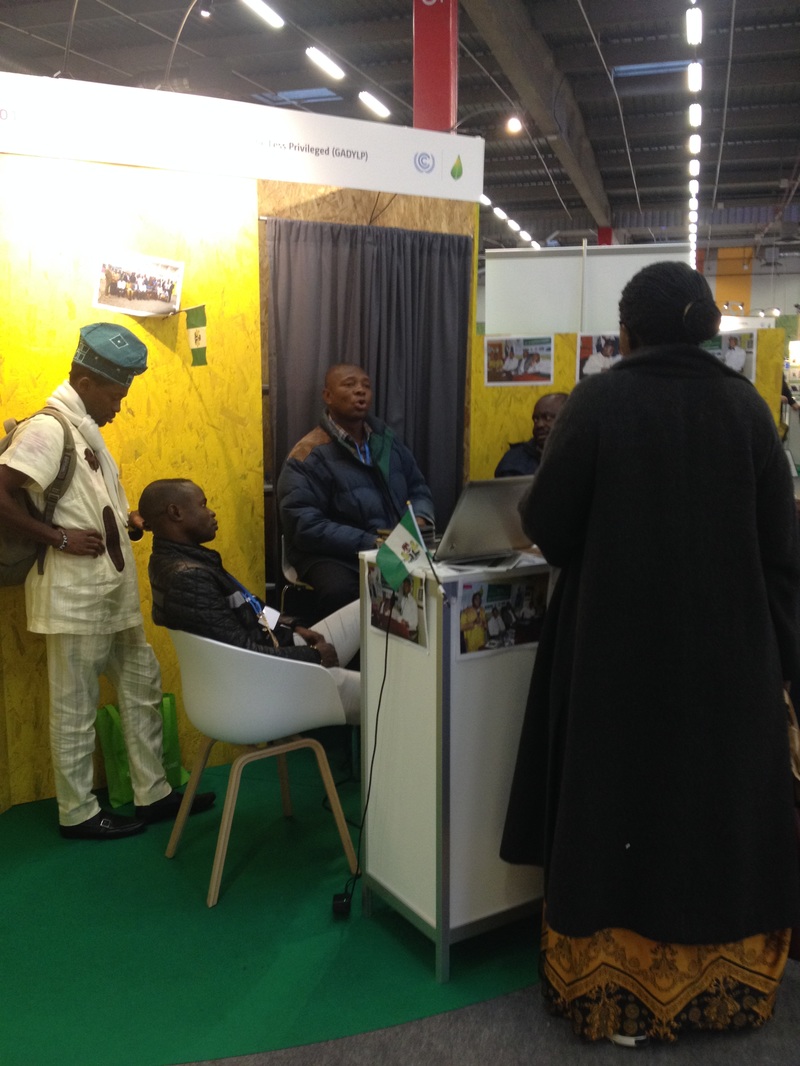|
I just finished a long conversation with Prince Goodluck Obi, President/CEO/Founder of Global Alert for Defense of Youth and the Less Privileged (GADYLP) in Nigeria. His NGO promotes climate literacy among young people in Nigeria at all levels of schooling. One of GADYLP’s biggest projects is starting tree planting clubs in schools, in which students plant Baobab Trees and Whistling Palm Plants while learning about climate change solutions. I asked Prince Obi how his organization reaches out to underprivileged communities. This is an issue that arose in my mind yesterday after I heard Dr. Spencer Thomas, Ambassador from Grenada, say that there is no place for “tokenism” in climate action. Climate change is an issue that affects us all (some will be affected sooner than others), and thus all identities and social classes should be educated and represented in climate solutions, particularly since underprivileged areas are often the ones hit the hardest.
I want to leave you with a quote Prince Obi gave me from one of his greatest Philosopher Kings: “What we do for ourselves perishes with us, but what we do for the good of others enjoys immortality.” - Nigerian Philosopher King (via Prince Obi) It is important that we, as well as the negotiators, remember that the climate change solutions we need here at COP21 are not necessarily about those with the loudest voices.
10 Comments
R. Ronson
8/12/2015 01:19:43 pm
It is so important that stories like this get out there. Many people in developed countries, even those who may claim to care about climate change, still don't realize that it is an ethical issue and that it hits impoverished regions the hardest. It's easy to ignore a crisis when it doesn't have a human face.
Reply
Greg Margida
9/12/2015 04:07:58 am
Thanks for your comment! I'm glad you see the sense of urgency in this situation. Please help these people in smaller and more vulnerable countries by raising awareness!
Reply
Michaela
9/12/2015 07:26:41 am
Such powerful words: "...climate change is about more than emissions. It is about people, and those people most affected are often out of sight." The balance between economic development and environmental conservation is a tricky one, with some countries practically disregarding their own impacts, because the people most affected are "out of sight, out of mind." This blog post beautifully communicates that point. How cool that you met and talked with a prince about these issues.
Reply
David Brownsword
9/12/2015 07:36:12 am
It's both horrible and interesting to see how the big countries that pollute (like the U.S. and China) are suffering much less damage from climate change than in Africa and especially the Pacific. I'm glad people like Prince Obi exist, we need more change rather than stubbornness.
Reply
Leigh Foy
9/12/2015 02:41:00 pm
Tree planting is so positive. Something everyone, no matter what their political background, can get behind. Pass this article on and get the word out!
Reply
9/12/2015 09:18:28 pm
This is indeed an interview that reveals the height of the neglect the hard-to-reach-communities face in respect of climate change issues and related matters.We are talking of those who live in the ghettos,the slums,the shanties.the riverine Communities etc.nationally,regionally and internationally etc.This is a nice article which needs real publicity via various media including electronic,print,social networks in order to create global awareness as per the plight of the POOREST of the Poor and related communities in respect of Climate action.Mr.Greg Margida you have done a master piece.BRAVO!
Reply
Alexis O
10/12/2015 05:51:30 pm
It is very important that youth learn about the dangers of climate change but also how it's impacting other countries. I give him 100% credit for risking a lot to reach out to these other communities. Its awesome to see all of you guys together!
Reply
Cathy
14/12/2015 08:48:08 am
I am glad to see a nation leader taking advantage and being at the front line of change. I admire Prince Obi for his efforts to lead the change. I know most often when people take on leadership roles they become consumed with the self benefits that they forget the responsibilities of that position. Indeed underdeveloped countries are mostly affected by the impact of wealthier countries. Regardless, it is nice to see these underdeveloped countries contributing to eliminating the effects of climate change. This movement requires a strong force propelled by unity and not division. It is good to see people working together for the good of us all.
Reply
William Warren
15/12/2015 06:33:26 pm
I agree that climate change is an issue affecting all of us. I think that it is good that Prince Goodluck Obi's NGO is promoting climate literacy among the youth in Nigeria. We have to start somewhere to solve this problem we face in our everyday lives.
Reply
Tyler M
17/12/2015 07:08:11 am
I really enjoyed seeing his quote and that speaks loudly. If everyone had this mindset in life not only dealing with COP 21 but in everything life hands us this world would be much less selfish and more enjoyable for the future. Since what we do now effects the rest of the world and the future
Reply
Leave a Reply. |
Categories
All
Archives
March 2024
|

 RSS Feed
RSS Feed
